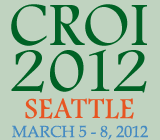Snigdha Vallabhaneni, X Li, E Vittinghoff, D Donnell, C Pilcher, and S Buchbinder, Univ of California, San Francisco, US; Fred Hutchinson Cancer Res Ctr, Seattle, WA, US; and San Francisco Dept of Publ Hlth, CA, US
Background: Although efficacy is unknown, some men who have sex with men (MSM) attempt to reduce their HIV risk by adapting their sexual practices to the perceived HIV serostatus of their partners. We used data from several cohorts to assess the association of seroadaptive practices with HIV seroconversion.
Conclusions: All seroadaptive practices considered in this study appear to be protective when compared to receptive anal sex with an HIV+ or unknown serostatus partner. MSM reporting monogamy and being top-only have the lowest risk of seroconversion, while those who practice seropositioning have a similar risk to those reporting no UAS. The increased risk associated with serosorting, compared to no UAS, likely results from mistaken perceptions of partner serostatus.
___________________________________________________________________________
An meta-analysis of HIV-negative gay men’s sexual behaviour and HIV incidence rate in four HIV prevention studies, presented aerlier this month at the 19th Conference on Retroviruses and Opportunistic Infections (CROI) has found that attempting to ‘serosort’ by restricting unprotected sex to partners known to be HIV-negative does have efficacy as an HIV prevention strategy when compared with having none at all.
Serosorting is, however, considerably less effective in reducing the chances of having HIV compared to other strategies such as monogamy, only having insertive sex, or ‘seropositioning’ (only taking the bottom role with partners known not to have HIV and being top with partners of positive or unknown status). ‘Seroadaptive’ behaviours include any method of attempting to reduce the risk of HIV acquisition or transmission by altering one’s sexual behaviour according to the HIV status of partners. The term ‘serosorting’ has been used in various different ways. Most commonly it means restricting unprotected anal sex to partners known to have the same HIV status as yourself. When unprotected sex between HIV-negative men is confined to a primary relationship, with condoms use in all other encounters, this has been called ‘negotiated safety’.
While some studies have found serosorting in HIV-negative men to be effective, others have not. Attempted serosorting by HIV-negative people has an inherent drawback that serosorting by HIV-positive people lacks: people can only be certain of their status up to the first time they risk exposure to HIV after their last negative HIV test. Research indicates that a large minority of people in high-risk communities who assume they are HIV-negative in fact have HIV, and that a large proportion of men who ‘know’ their partner’s HIV status have in fact tried to guess it.

